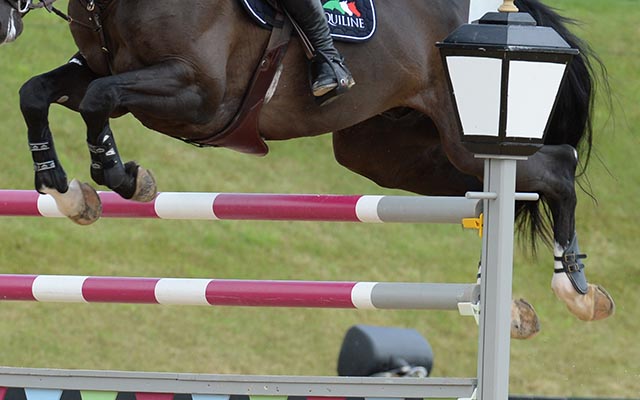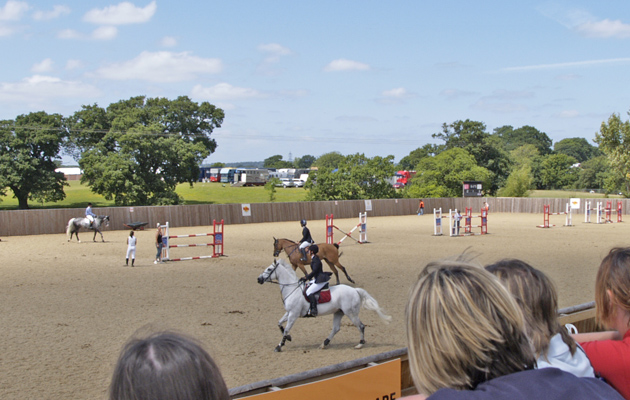Even the world’s elite riders aren’t immune to competition nerves. Martha Terry discovers how they channel their jitters into a winning performance
Nerves happen to the best of us. When Emily Philp was contesting her first Burghley, in 2019, she passed Pippa Funnell’s lorry en route to the cross-country. Bear in mind Pippa has a dozen Olympic, world and European medals, six five-star trophies and 30 five-star starts under her belt. Pippa leaned out of her lorry window to wish Emily good luck and check she was OK.
“I said, ‘No, I feel dreadful,’” Emily says. “And Pippa laughed, and said, ‘Trust me, it gets worse, not better.’”
Pippa went on to win, proving that nerves are no barrier to success. But how familiar her angst is to so many riders, whether we’re at British novice or Badminton.
On online equestrian forums, discussions about how to cope with competition nerves abound. Instant solutions such as gin, Rescue Remedy and Human Kalm Cookies (a human version of the equine ones) are suggested, alongside hypnotherapy, neuro-linguistic programming and performance psychology.
{"content":"PHA+QWZ0ZXIgbGFzdCB5ZWFy4oCZcyBzdG9wLXN0YXJ0IGNvbXBldGl0aW9uIHNlYXNvbiwgd2UgbWlnaHQgYmUgeWVhcm5pbmcgdG8gZmVlbCB0aG9zZSBidXR0ZXJmbGllcyBhZ2Fpbi4gQnV0IHdoZW4gdGhlIG5ldyBzZWFzb24gcmVzdW1lcyBhbmQgdGhlIHNpY2tlbmluZyBuZXJ2ZXMgZG8ga2ljayBpbiwgaXTigJlzIGhlbHBmdWwgdG8gcmVtZW1iZXIgdGhhdCB0b3AgcmlkZXJzLCB0b28sIGhhdmUgdG8gYmF0dGxlIHdpdGggdGhlaXIgb3duIGZlYXIgb2YgZmFpbHVyZSDigJMgYW5kIGhhdmUgbGVhcm5lZCB0byBjaGFubmVsIHRoZXNlIG5lZ2F0aXZlIHRob3VnaHRzIGludG8gd2lubmluZyByZXN1bHRzLjwvcD4KPHA+PGRpdiBjbGFzcz0iYWQtY29udGFpbmVyIGFkLWNvbnRhaW5lci0tbW9iaWxlIj48ZGl2IGlkPSJwb3N0LWlubGluZS0yIiBjbGFzcz0iaXBjLWFkdmVydCI+PC9kaXY+PC9kaXY+PHNlY3Rpb24gaWQ9ImVtYmVkX2NvZGUtMzEiIGNsYXNzPSJoaWRkZW4tbWQgaGlkZGVuLWxnIHMtY29udGFpbmVyIHN0aWNreS1hbmNob3IgaGlkZS13aWRnZXQtdGl0bGUgd2lkZ2V0X2VtYmVkX2NvZGUgcHJlbWl1bV9pbmxpbmVfMiI+PHNlY3Rpb24gY2xhc3M9InMtY29udGFpbmVyIGxpc3RpbmctLXNpbmdsZSBsaXN0aW5nLS1zaW5nbGUtc2hhcmV0aHJvdWdoIGltYWdlLWFzcGVjdC1sYW5kc2NhcGUgZGVmYXVsdCBzaGFyZXRocm91Z2gtYWQgc2hhcmV0aHJvdWdoLWFkLWhpZGRlbiI+DQogIDxkaXYgY2xhc3M9InMtY29udGFpbmVyX19pbm5lciI+DQogICAgPHVsPg0KICAgICAgPGxpIGlkPSJuYXRpdmUtY29udGVudC1tb2JpbGUiIGNsYXNzPSJsaXN0aW5nLWl0ZW0iPg0KICAgICAgPC9saT4NCiAgICA8L3VsPg0KICA8L2Rpdj4NCjwvc2VjdGlvbj48L3NlY3Rpb24+PC9wPgo8aDM+MS4gTWFpbnRhaW4gcGVyc3BlY3RpdmU8L2gzPgo8cD5NYXJ5IEtpbmfigJlzIHBlcnBldHVhbCBzbWlsZSwgd2luIG9yIGxvc2UsIG1hc2tzIHRoZSBuZXJ2ZXMgc2hlIHN0aWxsIGZlZWxzIGV2ZW4gYWZ0ZXIgYSBsaWZldGltZSBhdCB0aGUgdG9wIG9mIHRoZSBzcG9ydC48L3A+CjxwPlNoZSBvdmVyY29tZXMgaGVyIGppdHRlcnMgYnkga2VlcGluZyBhIHNlbnNlIG9mIHBlcnNwZWN0aXZlLjwvcD4KPHA+4oCcT2xkZXIgcmlkZXJzIG1heSBsb29rIHJlbGF4ZWQgYnV0IHRoZXJlIGFyZSBhbHdheXMgbmVydmVzIHVuZGVybmVhdGgs4oCdIHNoZSBzYXlzLiDigJxJIG1ha2UgbXlzZWxmIHJlbWVtYmVyIGhvdyBsdWNreSBJIGFtIHRvIGRvIHRoaXMgc3BvcnQuIEkgdGhpbmsgb2YgYWxsIHRoZSB3YXJzIGFuZCBzdGFydmluZyBwZW9wbGUgaW4gdGhlIHdvcmxkLCB3aGlsZSB3ZSBhcmUgcHJhbmNpbmcgYXJvdW5kIG9uIGhvcnNlcy4gV2UgYXJlIGp1c3Qgc28gZm9ydHVuYXRlLuKAnTwvcD4KPGRpdiBjbGFzcz0iYWQtY29udGFpbmVyIGFkLWNvbnRhaW5lci0tbW9iaWxlIj48ZGl2IGlkPSJwb3N0LWlubGluZS0zIiBjbGFzcz0iaXBjLWFkdmVydCI+PC9kaXY+PC9kaXY+CjxwPlRlYW0gR0JSIGRyZXNzYWdlIHJpZGVyIEdhcmV0aCBIdWdoZXMgdmlld3MgbmVydmVzIGFzIOKAnGFudGljaXBhdGlvbuKAnSwgdGhlIGRlc2lyZSB0byBwZXJmb3JtLiBIZSBmaW5kcyBwZXJzcGVjdGl2ZSBhIHVzZWZ1bCBsZW5zLjwvcD4KPHA+4oCcVGhlIG1haW4gdGhpbmcgdG8gcmVtZW1iZXIgaXMgdGhhdCBkcmVzc2FnZSBpcyBub3QgYWJvdXQgbGlmZSBhbmQgZGVhdGgs4oCdIGhlIHNheXMuIOKAnFdl4oCZcmUgbm90IHBhaWQgbWlsbGlvbnMuIEl04oCZcyBtb3JlIG9mIGEgcGVyc29uYWwgY2hhbGxlbmdlLiBZb3UgaGF2ZSB0byBwdXQgaXQgaW4gcGVyc3BlY3RpdmUu4oCdPC9wPgo8ZGl2IGNsYXNzPSJhZC1jb250YWluZXIgYWQtY29udGFpbmVyLS1tb2JpbGUiPjxkaXYgaWQ9InBvc3QtaW5saW5lLTQiIGNsYXNzPSJpcGMtYWR2ZXJ0Ij48L2Rpdj48L2Rpdj4KPGgzPjIuIEVtYnJhY2UgdGhlIG5lcnZlczwvaDM+CjxwPlBlcmZvcm1hbmNlIHBzeWNob2xvZ2lzdCBTYXJhaCBIdW50bGV5IHdvcmtzIG9uIOKAnHJlZnJhbWluZyByaWRlcnPigJkgbmVydmVzIGludG8gc29tZXRoaW5nIHBvc2l0aXZl4oCdLjwvcD4KPHA+4oCcVGhlIHBoeXNpb2xvZ2ljYWwgc2Vuc2F0aW9ucyBvZiBuZXJ2ZXMg4oCTIGJ1dHRlcmZsaWVzIG9yIGNsYW1teSBwYWxtcyDigJMgYXJlIG5vdCBuZWdhdGl2ZSBpbiB0aGVtc2VsdmVzOyBpdOKAmXMgdGhlIGVtb3Rpb24gd2UgYXR0YWNoIHRvIHRoZW0s4oCdIHNoZSBzYXlzLjwvcD4KPGRpdiBjbGFzcz0iYWQtY29udGFpbmVyIGFkLWNvbnRhaW5lci0tbW9iaWxlIj48ZGl2IGlkPSJwb3N0LWlubGluZS01IiBjbGFzcz0iaXBjLWFkdmVydCI+PC9kaXY+PC9kaXY+CjxwPuKAnEl04oCZcyBwYXJ0IG9mIG91ciBmaWdodCBvciBmbGlnaHQgcmVzcG9uc2UuIFNvIGluc3RlYWQgb2YgaW50ZXJwcmV0aW5nIG5lcnZlcyBhcyBhIG5lZ2F0aXZlLCB0cnkgdG8gdGhpbmsgb2YgdGhlbSBhcyBhIHBvc2l0aXZlOiDigJhUaGlzIHNob3dzIEnigJltIHJlYWR5OyBuZXJ2ZXMgd2lsbCBoZWxwIG1lIHBlcmZvcm0gYmV0dGVy4oCZLuKAnTwvcD4KPHA+V2lsbGlhbSBGb3gtUGl0dCwgd2hvIGJlbGlldmVzIG5lcnZlcyBhcmUg4oCcdW5pdmVyc2Fs4oCdLCB1c2VzIHRoaXMgYXBwcm9hY2g6IOKAnFRoZSB0cmljayBpcyB0byB0dXJuIHRoZW0gaW50byBzb21ldGhpbmcgcG9zaXRpdmUg4oCTIGFjY2VwdCB5b3UgY2Fu4oCZdCBhdm9pZCB0aGVtIGFuZCBpbnN0ZWFkIGVtYnJhY2UgdGhlbS4gTmVydmVzIGdldCB5b3VyIGJsb29kIHVwLCBtYWtlIHlvdSByaWRlIHdpdGggbW9yZSBhdHRhY2sgYW5kIHBvc2l0aXZpdHkuIFlvdSBoYXZlIHRvIGNvbnRyb2wgdGhlbSBzbyB0aGV5IHB1dCB5b3UgaW4gdGhlIGdyb292ZS7igJ08L3A+CjxwPlBpZ2d5IE1hcmNoLCB3aG8gaGFkIGEgcmVjb3JkLWJyZWFraW5nIHNlYXNvbiBpbiAyMDE5LCBhY3R1YWxseSB0aHJpdmVzIG9uIHRoZSBhZHJlbmFsaW5lIG5lcnZlcyBicmluZy48L3A+CjxwPuKAnE9mIGNvdXJzZSB5b3Ugc3RhcnQgdGhpbmtpbmcgYWJvdXQgd2hhdCBjYW4gYW5kIGNhbuKAmXQgZ28gd3JvbmcsIGJ1dCB5b3UgZmVlbCBzaGFycCzigJ0gc2hlIHNheXMuIOKAnEkgbGlrZSB0aGUgcHJlc3N1cmUsIEkgdGhpbmsgaXQgbWFrZXMgbWUgYmV0dGVyLiBJIHdha2UgdXAuIEnigJltIHF1aXRlIGxhaWQtYmFjayBuYXR1cmFsbHksIHdoYXQgd2lsbCBiZSB3aWxsIGJlLCBidXQgSSB0aGluayB0aGF0IGFsc28gY29tZXMgd2l0aCBhZ2UgYW5kIGV4cGVyaWVuY2Uu4oCdPC9wPgo8aDM+My4gU3RpY2sgdG8geW91ciBwbGFuPC9oMz4KPHA+UGlnZ3nigJlzIG90aGVyIG1ldGhvZCBmb3IgY29waW5nIHdpdGggdGhlIGJpZyBvY2Nhc2lvbiBpcyB0byDigJx0YWtlIG15IHN5c3RlbSB0byB0aGUgY29tcGV0aXRpb27igJ0uPC9wPgo8cD7igJxJdOKAmXMgZWl0aGVyIGdvb2QgZW5vdWdoIG9yIGl04oCZcyBub3Qs4oCdIHNoZSBzYXlzLiDigJxTbyB5b3UgaGF2ZSB0byBwcm9ncmFtIHlvdXJzZWxmIHRvIHJpZGUgZXhhY3RseSBob3cgeW91IHJpZGUgYXQgaG9tZS4gWW91IGdvIGludG8geW91ciBidWJibGUsIGRvIHRoZSBiZXN0IHlvdSBjYW4sIHRoZW4gZmVlbCBhbWF6ZWQgd2hlbiB5b3Ugc2VlIHRoZSBzY29yZWJvYXJkLuKAnTwvcD4KPHA+VHJlYmxlIENDSTUqIHdpbm5lciBIYXplbCBTaGFubm9uIGhhcyBzdWNoIGEgc3BlY2lmaWMgcGxhbiB0aGF0IHdoZW4gc2hlIGxhbmRlZCBoZXIgdGhpcmQgQWRlbGFpZGUsIGxhc3Qgc2Vhc29uLCBzaGUgZGlkbuKAmXQgZXZlbiBrbm93IHNoZeKAmWQgd29uLjwvcD4KPHA+4oCcTmVydmVzIGRvbuKAmXQgY2hhbmdlIHRoZSBza2lsbHMgeW91IGhhdmUsIHNvIHlvdSBoYXZlIHRvIHN0YXkgZGlzY2lwbGluZWQs4oCdIHNoZSBzYXlzLiDigJxNeSBjb2FjaCBIZWF0aCBSeWFuIGhhcyBwcmVwYXJlZCBtZSBob3cgdG8ganVtcCBsYXN0IHdoZW4gSeKAmW0gaW4gdGhlIGxlYWQuIEkgd2F0Y2ggdGhlIGZpcnN0IGZldywgdGhlbiBmcm9tIHdhcm1pbmcgdXAgdG8gZ29pbmcgaW50byB0aGUgcmluZywgSSBkb27igJl0IHdhdGNoIGFueW9uZSBlbHNlIGFzIEkgZG9u4oCZdCBuZWVkIHRvIGtub3cgaG93IHRoZXnigJl2ZSBkb25lLiBXaGVuIEkgd29uIEFkZWxhaWRlLCBwZW9wbGUgd29uZGVyZWQgd2h5IEkgZGlkbuKAmXQgbG9vayBoYXBwaWVyLCBidXQgSeKAmWQga25vY2tlZCB0d28gZG93biBhbmQgaGFkIG5vIGlkZWEgSSBoYWQgdHdvIGZlbmNlcyBpbiBoYW5kLuKAnTwvcD4KPGgzPjQuIFZpc3VhbGlzZTwvaDM+CjxwPlRoaXMgaXMgYSBjbGFzc2ljIHBzeWNob2xvZ2ljYWwgdGVjaG5pcXVlLCB0byBpbWFnaW5lIHBlcmZvcm1pbmcgd2hhdGV2ZXIgdGVzdCBsaWVzIGFoZWFkLiBHYXJldGggSHVnaGVzIGFkbWl0cyBoZSBkb2VzbuKAmXQgYWx3YXlzIHNsZWVwIHdlbGwgYmVmb3JlIGEgYmlnIGNoYW1waW9uc2hpcCwgYnV0IHNlZXMgaXQg4oCcbGlrZSBiZWluZyBleGNpdGVkIGJlZm9yZSBhIGhvbGlkYXnigJ0uIEhlIHVzZXMgYW55IHNsZWVwbGVzcyB0aW1lIHRvIGdvIHRocm91Z2ggc2NlbmFyaW9zIGFuZCBwYXN0IHRlc3RzLjwvcD4KPHA+4oCcSSB0cnkgdG8gZ2l2ZSBteXNlbGYgdGhlIG1lbnRhbCBpbWFnZSBvZiB3aGF0IHRoZSBqdWRnZSB3aWxsIHNlZSwgdG8gaGVscCBtZSBwcmVzZW50IHRoZSBiZXN0IHBpY3R1cmUs4oCdIGhlIHNheXMuIOKAnEkgYWxzbyB3YXRjaCB2aWRlbyBzbmlwcGV0cyBvZiBteXNlbGYgd29ya2luZyBhdCBhIGNvbXBldGl0aW9uIGFuZCBhc2sgbXlzZWxmIGlmIEnigJltIGhhcHB5IHdpdGggd2hhdCBJIHNlZSwgb3Igd2hldGhlciBJIG5lZWQgdG8gYWRhcHQgbXkgYXBwcm9hY2guIFZpc3VhbGlzYXRpb24gaXMgYSBiaWcgdGhpbmcgZm9yIG1lLCBiZWNhdXNlIGRyZXNzYWdlIGlzIGFsbCBhYm91dCB0aGUgaW1wcmVzc2lvbiB3ZSBnaXZlLuKAnTwvcD4KPHA+U2hvd2p1bXBlciBDaGxvZSBXaW5jaGVzdGVyIGFsc28gdXNlcyB2aXN1YWxpc2F0aW9uIHRvIGRpZmZ1c2UgYW54aWV0eSBiZWZvcmUgYW4gaW1wb3J0YW50IGNsYXNzLjwvcD4KPHA+4oCcSSB0cnkgdG8gcmVsYXggbXlzZWxmIGJ5IHdhbGtpbmcgdGhlIGNvdXJzZSBhbmQgdGhlbiB2aXN1YWxpc2luZyBqdW1waW5nIGl0IGluIG15IGhlYWQgc28gdGhhdCB3aGVuIGl0IGNvbWVzIHRvIHJpZGluZyBpbiB0aGUgcmluZywgaXTigJlzIGxpa2UgSeKAmXZlIGFscmVhZHkganVtcGVkIGl0LuKAnTwvcD4KPGgzPjUuIERpZmZ1c2UgdGhlIHByZXNzdXJlPC9oMz4KPHA+R2VtbWEgVGF0dGVyc2FsbCBzaG93anVtcHMgYWxvbmdzaWRlIGhlciBtYWluIGV2ZW50aW5nIGNhcmVlciBhbmQgaGFzIHRhbGtlZCBhYm91dCBob3cgdGhlIG5hdHVyZSBvZiBldmVudGluZyBtYWtlcyBpdCBtdWNoIG1vcmUgbmVydmUtcmFja2luZy48L3A+CjxwPldoaWxlIGZvciBoZXIgYnJpbGxpYW50IGZpdmUtc3RhciBjYW1wYWlnbmVyIEFyY3RpYyBTb3VsIHRoZXJlIGFyZSBvbmx5IG9uZSBvciB0d28gdGFyZ2V0cyBhIHNlYXNvbiDigJMgcHV0dGluZyBodWdlIHByZXNzdXJlIG9uIHRoZSBwb3RlbnRpYWwgZm9yIGEgdGlueSBtaXN0YWtlIOKAkyBzaG93anVtcGVycyBjYW4ganVtcCBncmFuZHMgcHJpeCBldmVyeSB3ZWVrZW5kLjwvcD4KPHA+V2lsbGlhbSBGb3gtUGl0dCBkZWFscyB3aXRoIHRoaXMgYnkgbG9va2luZyBhdCB0aGUgYmlnZ2VyIHBpY3R1cmUuPC9wPgo8cD7igJxZb3XigJl2ZSBkb25lIHlvdXIgcHJlcCBhbmQgaGF2ZSBnb3QgdG8gdGhpcyBzdGFnZSDigJMgdGhhdOKAmXMgYWxyZWFkeSBhIGdvb2Qgc2l0dWF0aW9uLOKAnSBoZSBzYXlzLiDigJxZb3UgaGF2ZSB0byBob3BlIGZvciB0aGUgYmVzdCBidXQgYmUgcHJlcGFyZWQgZm9yIHRoZSB3b3JzdC4gSW4gdGhlIGdyYW5kIHNjaGVtZSBvZiB0aGluZ3MsIGlmIHlvdSBtYWtlIGEgbWlzdGFrZSwgd2hvIHJlYWxseSByZW1lbWJlcnMgZXhjZXB0IHlvdT8gSXTigJlzIGFubm95aW5nIGFuZCBpdCBodXJ0cyBidXQgbGlmZSBnb2VzIG9uLuKAnTwvcD4KPHA+U2hvd2p1bXBlciBKb2UgU3RvY2tkYWxlIGRpZmZ1c2VzIHRoZSBwcmVzc3VyZSBieSBtYWtpbmcgaGFsZi1nb2FscyByYXRoZXIgdGhhbiBsb25nLXRlcm0gb25lcywgYW5kIGZvY3VzaW5nIG9uIHRoZSBwcm9jZXNzIHJhdGhlciB0aGFuIHJlc3VsdHMuPC9wPgo8cD7igJxZb3UgY2FuIHNheSB5b3Ugd2FudCB0byBqdW1wIG9uIHRoaXMgdGVhbSBvciBhdCB0aGF0IHNob3csIGJ1dCBhbnl0aGluZyBjYW4gZ28gd3JvbmcgYW5kIHB1dCB5b3UgYmFjayB0aHJlZSBtb250aHMg4oCTIHlvdeKAmXJlIHB1dHRpbmcgdW5uZWNlc3NhcnkgcHJlc3N1cmUgb24geW91cnNlbGYs4oCdIGhlIHNheXMuIOKAnEJ1dCBJIGNhbiBsb29rIGF0IG15c2VsZiBhbmQgc2F5LCDigJhJIHdhbnQgdG8gYmUgaW4gYSBiZXR0ZXIgcG9zaXRpb24sIGxpZ2h0ZXIgaW4gdGhlIHNlYXQsIGJlIG1vcmUgbGlrZSB0aGlzIHRvcCByaWRlcuKAmSwgYW5kIHRoZSByZXN1bHRzIHdpbGwgY29tZS7igJ08L3A+CjxwPlRvcCBqb2NrZXkgUmFjaGFlbCBCbGFja21vcmUgc2F5cyB0aGUgcHJlc3N1cmUgb2YgZXhwZWN0YXRpb24gY2FuIG1vdW50IHVwIHdoZW4geW914oCZcmUgcmlkaW5nIGEgYmlnIGZhdm91cml0ZSwgc28gc2hlIOKAnHRyaWVzIG5vdCB0byB0aGluayBhYm91dCBpdOKAnS48L3A+CjxwPuKAnFdoZW4gcGVvcGxlIHRhbGsgYWJvdXQgbWUgd2lubmluZyBjaGFtcGlvbnNoaXBzLCBJ4oCZbGwganVzdCBzbWlsZSBhbmQgbm90IHJlYWxseSByZXNwb25kLOKAnSBzaGUgc2F5cy48L3A+CjxwPkpvY2tleXMgaGF2ZSBhbXBsZSBvcHBvcnR1bml0eSB0byBwcmFjdGlzZSB1bmRlciBwcmVzc3VyZS4gUGVyaGFwcyBmcmVxdWVudCBjb21wZXRpdGlvbiBpcyB0aGUgc29sdXRpb24gdG8gc3RlYWR5IHRoZSBuZXJ2ZXMuIEFzIHRocmVlLXRpbWUgY2hhbXBpb24gRmxhdCBqb2NrZXkgU2lsdmVzdHJlIERlIFNvdXNhIHNheXM6IOKAnEkgdXNlZCB0byBnZXQgbmVydm91cyBidXQgbm90IG5vdy4gV2hlbiB5b3UgaGF2ZSAxMiByYWNlcyBhIGRheSB5b3UgZG9u4oCZdCBoYXZlIHRpbWUsIGFuZCB5b3XigJlyZSB1c2VkIHRvIGl0LuKAnTwvcD4KPGgzPjYuIFJlbWVtYmVyIHdoeSB5b3UgZG8gaXQ8L2gzPgo8cD5Tb21lIHJpZGVycyB3YWtlIHVwIG9uIGNvbXBldGl0aW9uIG1vcm5pbmcgc28gc2ljayB3aXRoIG5lcnZlcyB0aGV5IHF1ZXN0aW9uIHdoZXRoZXIgdGhleSBlbmpveSB0aGUgc3BvcnQgYXQgYWxsLjwvcD4KPHA+U2FyYWggSHVudGxleSByZWFzc3VyZXMg4oCcaXTigJlzIG5vcm1hbCBmb3IgbW90aXZhdGlvbiB0byBmbHVjdHVhdGUg4oCTIGVzcGVjaWFsbHkgd2hlbiBpdOKAmXMgNmFtIGFuZCBsYXNoaW5nIGRvd24gd2l0aCByYWluLjwvcD4KPHA+4oCcVGhpbmsgb2Ygd2hhdCB5b3UgbG92ZSBtb3N0IGFib3V0IHJpZGluZywgYXNpZGUgZnJvbSBjb21wZXRpdGlvbizigJ0gU2FyYWggc3VnZ2VzdHMuIOKAnFNvbWV0aW1lcyBhIHNpbXBsZSBsb3ZlIG9mIGhvcnNlcyBnZXRzIGZvcmdvdHRlbi7igJ08L3A+CjxwPkNobG9lIGZpbmRzIHRoaXMgaGVscGZ1bDog4oCcTXVtIGFsd2F5cyBzYXlzIEkgaGF2ZSB0byByZW1lbWJlciBJIGRvIHRoZSBzcG9ydCBiZWNhdXNlIEkgZW5qb3kgaXQuIFNvbWV0aW1lcyB5b3UgY2FuIGJlY29tZSBzbyBmb2N1c2VkIG9uIGdvaW5nIHdlbGwgeW91IGZvcmdldCB0aGUgcmVhc29uIHlvdSBnbyBpbnRvIHRoZSByaW5nIOKAkyB0aGF0IHlvdSBsb3ZlIHdoYXQgeW91IGRvIGFuZCB0aGF04oCZcyB2ZXJ5IGltcG9ydGFudC7igJ08L3A+CjxoMz43LiBPbiB0aGUgZGF5PC9oMz4KPGRpdiBjbGFzcz0iaW5qZWN0aW9uIj48L2Rpdj4KPHA+VGhlIGtleSBpcyB0byBkbyB3aGF0ZXZlciBzdWl0cyB5b3UuPC9wPgo8dWw+CjxsaT5NZSB0aW1lOiDigJxJIGxpa2UgdG8gc2l0IGFsb25lIGluIHRoZSBsb3JyeSBmb3IgYW4gaG91ciBhbmQgd2F0Y2ggYSBEVkQsIGhhdmUgYSBiaXQgb2YgdGltZSB0byBteXNlbGYs4oCdIHNheXMgR2FyZXRoIEh1Z2hlcy4g4oCcQXQgdGhlIEV1cm9zIEkgZmVsbCBhc2xlZXAgb24gYSBjaGFpciBpbiB0aGUgc3RhYmxlIGJsb2NrLiBTb21lIHBlb3BsZSBnZXQgdGlyZWQgd2l0aCBuZXJ2ZXMsIG90aGVycyBnZXQgc2tpdHRpc2guIElmIHlvdeKAmXJlIHRoYXQgdHlwZSwgaXTigJlzIGJlc3QgdG8ga2VlcCBidXN5LuKAnTwvbGk+CjxsaT5UYWtlIGEgZGVlcCBicmVhdGg6IENobG9lIFdpbmNoZXN0ZXIgc2F5cywg4oCcSSB0YWtlIHRocmVlIGRlZXAgYnJlYXRocyB3aGlsZSByZWxheGluZyBteSBzaG91bGRlcnMgYmVmb3JlIEkgZ28gaW50byB0aGUgcmluZy4gSXQgcmVhbGx5IGZvY3VzZXMgbXkgY29uY2VudHJhdGlvbi7igJ08L2xpPgo8bGk+T3JnYW5pc2F0aW9uOiDigJxZb3UgZG9u4oCZdCB3YW50IGFueSBzdXJwcmlzZXMgb24gY29tcGV0aXRpb24gZGF5LOKAnSBzYXlzIFNhcmFoIEh1bnRsZXksIOKAnHNvIGhhdmUgZXZlcnl0aGluZyByZWFsbHkgd2VsbCBwbGFubmVkIGZvciB0aGUgbW9ybmluZyBvZiBhIGNvbXBldGl0aW9uLCBpbmNsdWRpbmcgYSBwbGFuIEIgc28gaWYsIHNheSwgdGhlIGhvcnNlIGRvZXNu4oCZdCBsb2FkLCB5b3Ugc3RpbGwgaGF2ZSB0aW1lLiBUaGlzIGhlbHBzIG1haW50YWluIGEgbGV2ZWwgb2YgY2FsbS7igJ08L2xpPgo8bGk+TW9zdCBvZiB1cyB3aWxsIG5ldmVyIHJlYWNoIHRoZSBnaWRkeSBoZWlnaHRzIHRoYXQgUGlwcGEgRnVubmVsbCBoYXMsIGJ1dCB0aG9zZSBuZXJ2ZXMsIGNvbW1vbiB0byB1cyBhbGwsIGFyZSBzdXJtb3VudGFibGUuIEtlZXAgY2FsbSBhbmQgY2Fycnkgb24ga2lja2luZyBvbi48L2xpPgo8L3VsPgo8cD5TcG9ydCBwc3ljaG9sb2dpc3QgU2FyYWggSHVudGxleSAocGljdHVyZWQpIGNvLXJ1bnMgQ2VudHJlIDEwLCBvZmZlcmluZyBwZXJmb3JtYW5jZS1hcHBsaWVkIHBzeWNob2xvZ3kgdHJhaW5pbmcgdG8gZXF1ZXN0cmlhbiBjb2FjaGVzIGFuZCByaWRlcnMsIGFuZCBhbHNvIGNvbXBldGVzIGF0IGludGVybmF0aW9uYWwgbGV2ZWwgaW4gYXF1YXRobG9uIGFuZCByb3dpbmcuIFNhcmFo4oCZcyBhZHZpY2UgaXM6PC9wPgo8dWw+CjxsaT5IdW1hbnMgbmF0dXJhbGx5IGhhdmUgYSBuZWdhdGl2ZSBiaWFzIOKAkyB3ZSBmZWVsIG5lZ2F0aXZlIHRob3VnaHRzIGZpdmUgdG8gc2V2ZW4gdGltZXMgbW9yZSBzdHJvbmdseSB0aGFuIHBvc2l0aXZlLiBSZW1lbWJlciB0aGF04oCZcyBhIG5vcm1hbCBiaWFzIHRoYXQgbWFrZXMgYWxsIG9mIHVzIHByb25lIHRvIG5lcnZlcyBhbmQgcmVtZW1iZXJpbmcgbmVnYXRpdmUgZXhwZXJpZW5jZXMgbW9yZSByZWFkaWx5IHRoYW4gcG9zaXRpdmUgb25lcy48L2xpPgo8bGk+Rm9yIHJpZGVycyB3aG8gZmVlbCBzaWNrLCB3b3JrIG91dCBvdmVyIHRpbWUgd2hhdCBmb29kIGlzIE9LIGZvciB5b3UgYXMgeW914oCZbGwgbmVlZCBzb21ldGhpbmcg4oCTIHBlcmhhcHMgcGxhaW4gdG9hc3Qgb3IgYW4gZW5lcmd5IGRyaW5rIGluIHRoZSBtb3JuaW5nLiBBbmQgZm9jdXMgb24gZGVlcCwgc2xvdywgbmFzYWwtYnJlYXRoaW5nIHRvIGhlbHAgeW91IHJlbGF4LjwvbGk+CjxsaT5Gb2N1cyBvbiB0aGUgcHJvY2VzcyBub3QgdGhlIHJlc3VsdCBvciBvdXRjb21lLiBIb3cgZG8geW91IG5lZWQgdG8gcmlkZSB0byBnZXQgdGhhdCBjbGVhciByb3VuZD8gQ29uY2VudHJhdGUgb24gZG9pbmcgdGhhdCwgbm90IHdoYXTigJlzIGF0IHN0YWtlLiBJbiBDZW50cmUgMTAsIHdlIGNhbGwgdGhpcyB0aGUg4oCcaW5zaWRlLW91dOKAnSBtaW5kc2V0LiBZb3UgbWF5IHdhbnQgdG8gZm9jdXMgb24gYSBjb3VwbGUgb2Ygd29yZHMsIGxpa2Ug4oCccmh5dGht4oCdIG9yIOKAnGNhbG3igJ0uPC9saT4KPGxpPlRoZSByaWRlcuKAmXMgZW52aXJvbm1lbnQgb24gdGhlIGRheSBpcyB2ZXJ5IGltcG9ydGFudCDigJMgd2hvIHRoZXnigJlyZSB0cmF2ZWxsaW5nIHdpdGggYW5kIGhvdyB0aGF0IHBlcnNvbiBzaG91bGQgYmVoYXZlIHdpdGggdGhlbSwgd2hldGhlciBjYWxtIG9yIG1vdGl2YXRpbmcuIFRoaXMgbmVlZHMgdG8gYmUgY29tbXVuaWNhdGVkIGJlZm9yZSBzbyB0aGF0IHBhcnRuZXIgY2FuIHN1cHBvcnQgcmF0aGVyIHRoYW4gc3RyZXNzIHRoZSByaWRlciBvdXQuPC9saT4KPGxpPkFuZCBpZiBpdCBkb2VzbuKAmXQgZ28gd2VsbCwgZG9u4oCZdCBjYXRhc3Ryb3BoaXNlLiBQdWxsIG91dCB0aHJlZSBvciBmb3VyIHBvc2l0aXZlcyBmcm9tIHRoZSBleHBlcmllbmNlIGJlZm9yZSBtb3Zpbmcgb24gdG8gd2hhdCB5b3UgbmVlZCB0byB3b3JrIG9uLiBBbmQgcmVtZW1iZXIgd2UgbGVhcm4gbW9yZSBmcm9tIHBlcmNlaXZlZCBmYWlsdXJlIHRoYW4gd2hlbiBpdCBhbGwgZ29lcyBzbW9vdGhseS48L2xpPgo8L3VsPgo8cD5Ib3cgZGlkIHlvdSBvdmVyY29tZSBuZXJ2ZXM\/IFdyaXRlIHRvIHVzIGF0IDxhIGhyZWY9Im1haWx0bzpoaGxldHRlcnNAZnV0dXJlbmV0LmNvbSIgdGFyZ2V0PSJfYmxhbmsiIHJlbD0ibm9vcGVuZXIgbm9yZWZlcnJlciI+aGhsZXR0ZXJzQGZ1dHVyZW5ldC5jb208L2E+PC9wPgo8cD48ZW0+UmVmOiA3IEphbnVhcnkgMjAyMTwvZW0+PC9wPgo8cD4K"}
You might also be interested in…
Credit: Peter Nixon
Do you suffer from competition riding nerves? Find out how to take control and use nerves to improve your performance
Credit: Rachel Fraser
There is a wealth of tips on how to combat competition nerves online, but do they work for everyone? Rachel
You don't need a flashy warmblood to compete in affiliated dressage – all types and breeds of horse and pony are welcome.
Credit: Jon Stroud Media
H&H features editor
Martha is an experienced journalist who is mad-keen on horses and dogs. Her reporting CV includes the Paris Olympics, European championships, Aachen World Equestrian Festival and World Cup finals. After growing up with assorted liver and white springer spaniels, she enjoyed 14 years with two rescue dogs. Now, her constant companion is Fidget, an extremely energetic and habitually muddy black and white springer. Martha has written on topics as diverse as a top horse’s clone to the best GPS trackers for dogs, as well as equestrian and rural matters for Country Life, The Field, The Times, The Spectator and The Telegraph alongside Horse & Hound .





